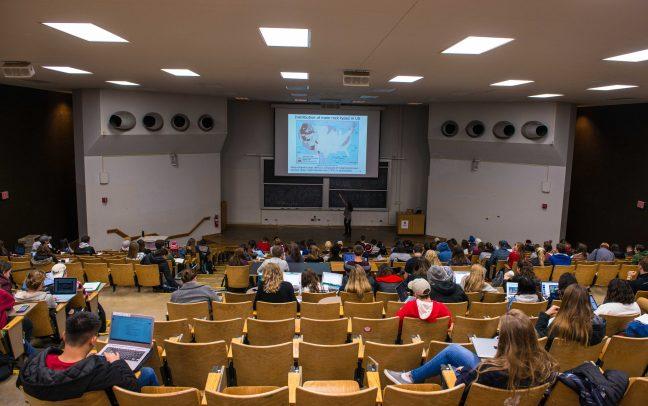Nearly six months ago we began to hear the first whispers of news from the Chinese city of Wuhan. The virus seemed light-years away, and the miles in-between seemed plenty adequate for keeping it that way.
Today, at the end of September, we are still dealing with the repercussions of our nonchalance. Europe teeters on stability as case numbers spike and ebb, Americans can’t decide if science is real and transmission rates in Wisconsin remain alarmingly high. Even more astounding, there are 2,400 freshman students that had to enjoy their first weeks at school in a mandatory 14-day quarantine.
Sept. 7, students received an email from University of Wisconsin Chancellor Rebecca Blank. Among the email’s many mandates, rationalizations and bullet points was a very clear order to implement a two-week quarantine for the residents of Sellery and Witte dorms at 10 p.m. Upperclassmen watched in awe as freshmen scrambled to buy enough nonperishable goods to last them through doomsday.
With social life looking different than ever before, students should consider joining Greek life
The impressive speed with which COVID-19 spreads has already become apparent to students.
Alec Apter, a junior at UW, said, “I live in a house with over a dozen other residents, and not long after one of us first showed COVID-19 symptoms, the rest of us followed suit alarmingly fast. You could literally trace the spread from room to room.”
It is genuinely understandable that the school had to react with such extreme measures. People are entitled to put as much urgency into COVID-19 as they please, but it’s not logical or sustainable to ignore a widespread sickness with the potential for devastating results.
For that reason, Blank reacted with appropriate vigor. But her email was filled with bewilderment at the situation as if this wasn’t an inevitable consequence of remaining open.
The opening line read, “UW-Madison has taken extraordinary measures to prioritize the health and safety of our students, faculty and staff while facilitating some form of in-person activity this fall.”
But, continuing face-to-face instruction is not taking extraordinary measures. The statement contradicts itself.
So there is a lingering sentiment among the some of the student population, a question being asked with callous amusement — what did you expect?
What did Bank expect? What did Madison expect?
With less energy from ‘Zoom Exhaustion,’ UW needs to invest in their students
While at home in July, it was already apparent that come move-in time in August, UW was going to face some jarring realities. Everybody knew this was going to be wildly messy.
What was the plan? Take 44,000 young students from every state in the nation and cram them into a few square miles of downtown Madison? Send intermittent messages of encouragement, promising a successful year and an attitude of perseverance? Insist that hybrid instruction is a viable method for retaining a sense of normalcy, and pretend that thousands of young adults will remain huddled in their rooms, eyes glued to the red glow of Canvas on their computer screen?
According to UW faculty, that was effectively the plan.
To be fair, there never was a perfect solution. Either this virus completely halts the American education system and the economy — which none of us want — or we commit to an unstable strategy of trial and error in hopes of wading through these floodwaters.
Most would opt for the hopeful attitude of the latter. For that reason, It is understandable UW is just trying to get it right. People want the show to go on. Students want to go to college. Colleges want student’s money. See? Everybody, deep down, is on the same page.
Colleges had enough data to make an informed decision about the viability of bringing students back to campus. They know that a hybrid system is not a solution, but a distraction.
This year won’t be normal, so we need to stop pretending as if it will be. If Wisconsin wants to be open for business, classes should have been completely online from the start and universities should have admitted that their very design is conducive to pandemic spread. This means preparing for the inevitable spikes instead of operating as if we can beat it.
Again, there are no perfect solutions. Wearing a mask walking through a restaurant only to take it off at the table seems silly, but at least it’s something. The point is not that solutions are ideal but that people are trying their best to keep one another safe. Universities then have an obligation to accept that which is apparent and take responsibility for the consequences of remaining open.
They need to stop acting as if this situation is not a foregone conclusion, because it is, and shift towards damage control. Time is wasted on ordering off-campus students to cease gatherings.
Instead of attempting to control that which they cannot, colleges have to focus on what they can — this means halting all in-person instruction and abandoning this messy hybrid system for good.
Luke Carmosino (lc[email protected]) is a junior majoring in history and economics.





















